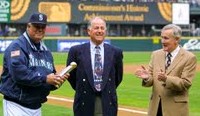
LAKE BUENA VISTA, Fla. Pat Gillicks four years as Mariners general manager, successful as it was, wasnt nearly long enough to get him into the Hall of Fame.
The Mariners averaged 98 wins per season with Gillick calling the shots. But four years in Gillick’s line of work scarcely makes a career. When blended with his success in Toronto, Baltimore and Philadelphia, Gillick became the stuff of legend among his peers.
So it came as no surprise Monday that he was voted into the Hall of Fame by the expansion era committee.
The expansion era committee is the name for one of three subsets that used to be known as the veterans committee. It votes on participants in the expansion era of sports, starting in 1961. The committee is made up of eight Hall of Fame players, four executives and four writers.
In Seattle, Gillick was in charge from 2000-2003, the peak of franchise success, including a 2001 season in which Seattle set the American League record with 116 wins. In his time, the Mariners won 393 games.
In 2001, “we would win 10 in a row, and wed lose one, and our manager at the time, Lou Piniella, would say, `I need a left-handed hitter, said a chuckling Gillick, who still lives in Seattle. “That year was just one of those magical years where things just fell into place. That year, A-Rod (Alex Rodriguez) had gone over to Texas. The year before we had lost Griffey (Ken Griffey Jr.) to Cincinnati.
“We were very, very fortunate on that club, and on most of the clubs that weve had, that weve had good character people that pulled together at difficult times. Its something that you really cant explain, winning 116 games.
The current Seattle general manager, Jack Zduriencik, didnt get his first GM job until 2009, the year after Gillick semi-retired for the second time, leaving the Philadelphia GM job to move into a consulting job with the Phillies.
But Zduriencik had been working his way up the ladder during most of Gillicks years in charge, and Monday saw Zduriencik heaping praise upon his predecessor.
“Everybody here is really happy, Zduriencik said from baseballs winter meetings in the suburbs of Orlando. “He did a tremendous job here.
Gillick tried to lay off much of the credit to managers, players, front office executives and, most important, his scouts.
“I think really the job of the general manager is not to select the correct players, Gillick said. “Its to select the correct people to select the players. Everywhere along the way, Ive been very fortunate to have people that were good evaluators of talent.
Gillick teams won the World Series twice in Toronto and once in Philadelphia. He spent a decade building a quality team from scratch in Toronto, Seattle’s 1977 expansion twin. ear. In his last dozen full seasons as a GM, Gillicks teams won 90 or more games eight times and had only one losing season.
“He was arguably the best general manager of his generation, Seattle president Chuck Armstrong said. After 2003, Gillick stepped aside to take a consulting position with the Mariners after back-to-back seasons in which the club didnt make it to the playoffs, even though Seattle won 93 games both years. “Hes extremely gifted, and we knew that. We didnt want him to leave.
“We tried very hard to get him to change his mind after he told us he was stepping aside. But we hadnt made the playoffs, and he was very sensitive about that. The 93 wins were one thing, but we didnt make the playoffs.
Gillick, who came close to tears at the announcement, said that part of being a good GM was being flexible in assessing not only the talent in the market, but in assessing the direction of the game itself.
“When I started out in this game, I thought it was 70 percent ability and 30 percent character, Gillick said. “The longer Ive been in it, I think its 60 percent character and 40 percent ability. Because if you’re going to be out there through spring training in 162 games, you need people with character.
“We were very fortunate on most of the clubs weve had, that weve had good character people who pulled together at difficult times.
If so, it was because Gillick adapted as his 70-30 philosophy evolved.
Gillick grew up in an era when scouting meant everything. But as baseball progressed into a time of exotic stats-based evaluations, he wasnt left behind.
As Armstrong said, Gillick “is a sponge for talent.
Gillick doesnt care much for email. He doesnt answer his cell phone, arguing that its for making calls, not answering them. He answers his office phone, when hes in his office, which isnt often; he likes to be on the road looking at talent. And he burns up the cellular world dialing a contact list as extensive as any in baseball.
“He will call everybody he knows, Armstrong said. “And sometimes that would result in rumors getting started. But sometimes the calls were for purposes of comparison. And there was the occasional red herring. But he reached out to everybody as part of the decision-making process.
Now hes getting credit from all, like it or not.
John Hickey is a senior MLB writer for AOL FanHouse (www.fanhouse.com)
Twitter: @JHickey3
